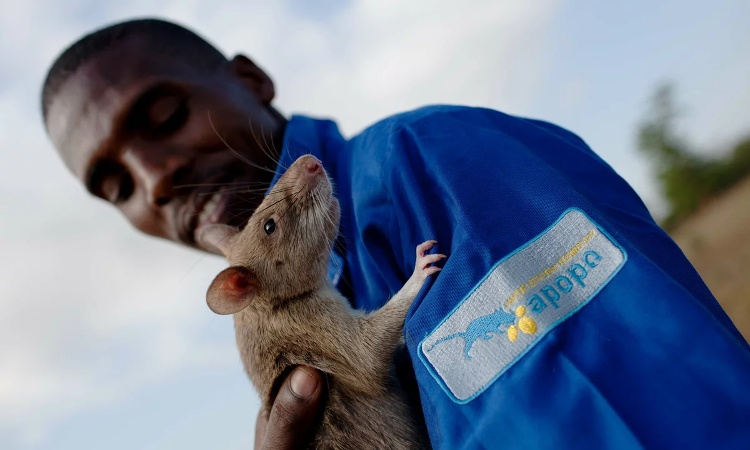Giant mice sniff TB, detect mines
Giant African kangaroos, trained to detect mines, are contributing to the fight against tuberculosis in Tanzania and Mozambique.

African giant mice are famous for their sharp sense of smell.(Photo: Animal Planet)
According to Guardian, scientists in eastern Africa plan to use the mouse's sharp sense of smell to filter tuberculosis from offenders in crowded prisons in Tanzania and Mozambique.
The giant African kangaroo, trained by Belgian non-governmental organization APOPO, is well known for its ability to vaporize mines . Now they are also gaining popularity in East Africa thanks to the skill and speed of detection of TB.
Tuberculosis is a leading contagious disease after HIV. Every year, there are about 9 million cases worldwide and about 2 million deaths from tuberculosis, according to the World Health Organization (WHO).
In Tanzania, people in the communities where TB is most common, including prisons, often do not seek medical care because of a lack of money or a poor sense of consciousness, creating a heavy burden for health authorities trying to disease management. Because the current system is inaccurate, testing for this highly infectious disease requires fast speed and low cost. Many cases are not diagnosed by a team of doctors.

A young African giant mouse was hugged by APOPO staff after completing the training in Morogoro, Tanzania.(Photo: AFP)
APOPO is planning to recruit and train more mice to conduct prison inspections and believes that this way is faster and more reliable than current methods.
" We believe the mouse technology for tuberculosis detection will prove itself to be an effective mass screening tool. After that, we aim to expand the program at all prisons, slums, factories and Many other populated areas in Tanzania, Mozambique and other countries with high rates of tuberculosis, along with high-risk groups such as individuals infected with HIV / AIDS, will help improve lives and save lives. Network around the world at low cost , "said Charlie Richter, APOPO director.
Although it is difficult to get data from African prisons, research from Tanzania, Malawi and Ivory Coast indicates a 10 times higher rate of tuberculosis in prison than the general population, according to the Centers for Infectious Diseases Control. America.
The mice will undergo rigorous training when they are 4 weeks old. As soon as they open their eyes, they are acquainted with countless stimuli, learning how to make friends and interact with people. Mice learn to recognize TB in saliva or mucus samples shot from the lower respiratory tract when the patient sneezes and is rewarded for success.
The test begins when the mouse stands in front of 10 vertical saliva samples and it stops for no more than three seconds in each specimen, according to Richter. The exact detection rate of rats in mice was almost 100%, but they could not distinguish between common bacteria and resistance, scientists at APOPO said.
APOPO's system is very fast, cheap and has the potential to lower screening costs in poor countries, according to Richter. While the laboratory technician takes 4 days to detect tuberculosis, a trained mouse can test 100 specimens for 20 minutes and the cost for each screening costs only 0.2 USD.
APOPO's current program examined more than 340,000 samples of tuberculosis, prevented more than 36,000 infections and increased disease detection rates to more than 40% in some partner clinics.
- Animals have the ability to detect superhuman mines
- Training mine bombing
- Amphibians can sniff underwater
- The mole rats eat the mouse rat manure to get instructions for raising children
- China caught a giant
- The British people panicked because the giant mouse raged
- Africa uses mice to clear mines
- The biggest mouse in the world is as big as a small dog
- Strangely, the mouse has giant ears
- Big mouse like a cat raging in America
- The robot knows how to sniff
- Catch the giant mouse gnawing on the concrete wall
 'Fine laughs' - Scary and painful torture in ancient times
'Fine laughs' - Scary and painful torture in ancient times The sequence of numbers 142857 of the Egyptian pyramids is known as the strangest number in the world - Why?
The sequence of numbers 142857 of the Egyptian pyramids is known as the strangest number in the world - Why? History of the iron
History of the iron What is alum?
What is alum?